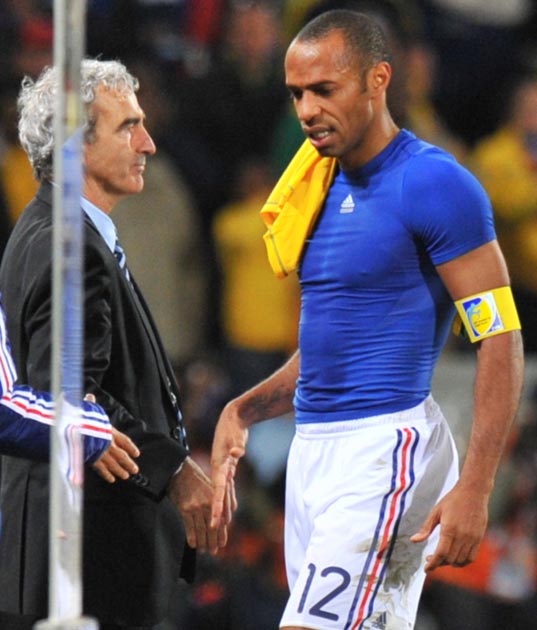'Future of France' at stake as Sarkozy meets Henry

President Nicolas Sarkozy cleared his schedule yesterday morning to talk to a Very Important Person about no less significant a matter than "the future of France".
A presidential car met the VIP at Le Bourget airport, and sped him directly to the Elysee Palace. The visitor was admitted by a back entrance to avoid (and irritate) the waiting press and anxious public. Nothing was allowed to emerge from the presidential discussions.
It is reasonable to assume that the talks were grave and momentous. To make room in his schedule, Mr Sarkozy had blown out a meeting with French voluntary relief organisations about the fate of 3,000,000,000 poor people in the developing world. Across town, a hundred thousand people were marching to protest against the president's plan to raise the pension age.
Neither of these issues was as important to the "future of France" as the evidence presented to President Sarkozy by his VIP visitor. He was Thierry "Hand of Frog" Henry, aged 32, Barcelona and former Arsenal striker and an eye-witness to the calamitous events in South Africa which have made "Les Bleus", the French national football team, the laughing-stock of the world.
The "France" whose future was under discussion at the Elysee Palace yesterday was not the world's fifth largest economy (with the G20 summit in Toronto only two days away). It was the France team which won the World Cup in 1998 and came second in 2006 but crashed out of South Africa 2010 at the group stage this week. (Team record: bottom of group, no victories, one goal, a player's mutiny and a leading striker sent home for telling the manager to "go and get yourself expletive deleted".)
The Elysee said that Mr Henry had sought the meeting to explain what had really happened in South Africa. Friends of Mr Henry said that President Sarkozy, a passionate, match-going, football fan, had sought the meeting more in fury than in sorrow.
Political opponents insisted that Mr Sarkozy had cynically called the meeting to distract from the anti-pension demos. The jilted French voluntary relief groups said that President Sarkozy was a disgrace and retaliated by refusing to meet Bernard Kouchner, the foreign minister.
Daniel Cohn-Bendit, passionate, match-going football fan, former revolutionary and Green politician, said that the "pantomime" of Les Bleus had gone into "extra time" and achieved "a new pinnacle of the ridiculous".
Under the rules of the world football body, FIFA, political interference in football is not allowed. President Sarkozy has, nonetheless, ordered a "football parliament" in October to consider the implications of the South African debacle.
Whatever FIFA, or Medecins sans Frontieres, might think, the melt-down of Les Bleus is deeply political. The dire performances of the team and the public rebellion by the mostly black players have generated an outpouring of scarcely-disguised racial bile from centre-right politicians and commentators in the last two days.
Roselyne Bachelot, the minister for health and sport, told the National Assembly on Wednesday night that the problems had been caused by a few immature "caids" or "gang-bosses" - a word mostly used in France to describe the leaders of teenage gangs in the troubled, multi-racial suburbs.
Alain Finkielkraut, a right-wing philosopher, said that the team was "not representative" of France. "We are watching the spirit of society being devoured by the spirit of the troubled estates," he said.
The minister for urban development, Fadela Amara had to call to order a meeting of Mr Sarkozy's parliamentary supporters on Wednesday night. Their quasi-racial abuse of the France team was "opening a boulevard" to the xenophobic National Front, she said.
The South African calamity has allowed an ugly truth to bubble to the surface. Many white, middle class French people have disliked the France team for years, partly because of their poor performances but also because the squad is dominated by black players. Mr Finkielkraut's belief that the team is "not representative" is widely felt.
Other commentators, including Ms Fadela, and the - white - midfielder from the 1998 world champions, Emmanuel Petit, have pointed to the inaccuracy and hypocrisy of many of these comments. The World Cup success of the 1998 team was hailed as a triumph for a multi-racial France. Many of its leading players were also born in troubled, multi-racial estates. They included yesterday's phantom VIP visitor to the Elysee Palace.
Join our commenting forum
Join thought-provoking conversations, follow other Independent readers and see their replies
Comments